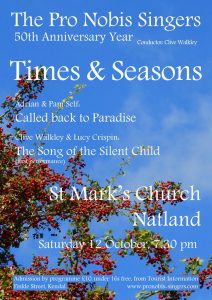 Are you sitting comfortably? Then we’ll begin.
Are you sitting comfortably? Then we’ll begin.
“In a time then and now/In a place far and near/In a world of which old stories tell/A land cradled in light―/Sun by day, moon by night―/Is held safe under summer’s sweet spell”. This is Summerland, where The Song of the Silent Child is set. The eponymous Silent Child is despised in this land of perpetual happiness, and it isn’t until she meets Old Mother Love, the Crone/wise woman who is dying, that the Child learns who she is: “’You go by (more…)
 This would be a fine place to spend eternity.
This would be a fine place to spend eternity.
From the lichened drystone wall where I sat the land rolled away to the horizon, a series of gradual grassy undulations punctuated with clumps of shrubs and trees. In the distance the peat browns and heather purples of the moor spread their muted patchwork; within the tiny churchyard itself, oaks, ashes and other trees were stretching (more…)
This is a wide-raging anthology of verse from a range of different cultures. Taking loss and grieving as its topic, the anthology is arranged into different sections. It doesn’t use the well-known—and sometimes unfairly-maligned—Kubler-Ross five stages of grieving. Instead, it groups the poems under: ‘reckoning’, ‘regret’, ‘remembrance’, ‘ritual’, ‘recovery’ and ‘redemption’. Apart from betraying the editor’s capacity skilfully to use alliteration (!), this grouping is, I think, a useful one, helping the reader to navigate the book and have a better chance of finding the right text for how that particular moment feels.
For me The Art of Losing is more stimulating than other collections of poems about loss and grief simply because every time I pick it up I meet a new author, or new poem, in which I can delight. Perhaps this is, in part, due to its focus on new and contemporary writing: Young explains that while he he has included a few ‘absolutely necessary’ C19th poems, he has ‘tried to stick to poems that are contemporary classics, or soon ought to be’. Other grief anthologies will give you wisdom, heartbreak and love from across the centuries, reminding you of what is universal in human experience over time. Those anthologies have their place: treasure remains treasure no matter how old it is. But Young gives us the chance to uncover new treasures.
There are too many authors included for me to be able to give any kind of representative list. All I can say is: buy this book. Whether you are grieving now, have grieved, work with those who grieve, or simply want to meet some new poems that will find you, then I don’t think this collection will disappoint. Treat yourself to it.
 Are you sitting comfortably? Then we’ll begin.
Are you sitting comfortably? Then we’ll begin. This would be a fine place to spend eternity.
This would be a fine place to spend eternity.